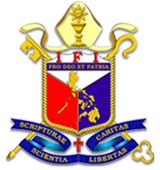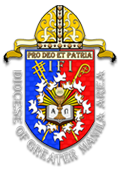DGMA’s Report to SCLBC Virtual Clergy Convocation
The Diocese of Greater Manila Area rendered a report for the South-Central Luzon Bishops Conference (SCLBC) through the Virtual SCL Convocation on November 9, 2020. This Report is based on the guidelines formulated by the SCL bishops.
Reflection on the current coronavirus (Covid-19) pandemic crisis: i.e., threats and opportunities for Church mission; strengths and weaknesses of the Diocese; and parishes’ response in dealing with the “new normal”:
- The Diocese identified some (1) threats such as: (a) Fear of being infected by Covid-19; (b) Sadness on the hindrance to do the regular worship services to our congregations; and (c) Anxiety on the economic impact and financial loss to the Diocese, parishes, and missions.
(2) The opportunities described include: (a) Personal and collective consciousness of health care of oneself and others: food and vitamin intake; proper hygiene, other healthy works and measures such as physical exercise, and the health protocols prescribed by the Department of Health on the use of face masks, hand and foot sanitizing, and physical (social) distancing.
- Counted as strength is the maximizing use of digital communication and transactions: the eagerness to learn the optimal use of social media and cashless “business” transactions.
- In dealing with the “new normal” the Diocese has adopted some digital mechanisms in celebrating the Holy Eucharist through the livestreaming technology. But not all parishes and missions are amenable because of lack of communication system and other instruments/gadgets. Generally, the Diocese reaches out to the congregations via the virtual/Zoom meetings, telephone calls, cellphone texting and social media use.
In the celebration of the Eucharist without actual communion, some parishes extend communion by bringing the Blessed Wafers to the members’ homes through the use of “Pix” containers and handed out to communicants during the livestreamed Mass at home.
The Diocese has maximized its online programs through the use of webinars and meetings via the Zoom platform:- The memorial service for the Double Ten celebration honoring the lives of Don Belong and Beluco as leaders of the IFI held at the diocesan cathedral.
- The formal launching of the Website, dgma.ph, on this same occasion.
- The Ecumenical Relations Committee’s sponsorship of the two fora on Palestine-Israel via Zoom in the month of September 2020.
- The DGMA Program Coordinator’s ecumenical participation as resource person in the RCC’s Radio Veritas Program, “Barangay at Simbahan,” in August 2020.
- The DGMA clergy participation in the Lecture Series (Webinars) hosted by the SCL Bishops Conference and the Office of the General Secretary.
- The DGMA clergy participation in the online programs of the Obispado Maximo.
- On preventive measures and remedial actions undertaken to mitigate the Covid-19 impact (e.g. steps taken to ensure the health and safety of the clergy, the congregations, and the community at large):
- DGMA followed the Philippine Government health protocols in responding to the pandemic: face masks, hand washing, social distancing, etc.
- Immediate relief through monetary assistance for priests (retired clergy included) sourced out from the diocesan buffer fund; rice and groceries also extended to clergy, parishes, and missions.
- Financial assistance to the Lumad Bakwit School in Quezon City.
- Quarantined senior clergy, unable to perform worship services, assisted by itinerant priest and the diocesan bishop.
- Cancelled mass gatherings of diocesan activities, but the 118th IFI Proclamation Anniversary celebrations were simultaneously held in parishes and missions with livestreamed Masses and video-message and benediction of the diocesan bishop.
- On new forms of ministries that emerged under the “new normal” (e.g. digital evangelization, diakonal services, rights advocacy, health program, humanitarian assistance).
The Diocese has initiated and participated in online activities through Webinars and Livestreamed Masses linking even members abroad, and providing information and updates through the diocesan website: dgma.ph.
- On Diocesan long-term plans to adapt to changes introduced by the “new normal” (i.e., new prospects for ministry and adaptive leadership measures):
- After post-Pandemic the Diocese will continue and strengthen the use of Webinars in implementing diocesan programs such as seminars, meetings, Bible studies, etc., as we have availed of our own Zoom account.
- The Diocese will explore a “video live-preaching, healing, and teaching” services and other pastoral care, to be posted in different social media platforms particularly in our own dgma.ph.
- The Diocese has formed an editorial and technical staff and working group to sustain the website that will facilitate trainings on digital communication.
- The Diocese has an applied “paid Zoom” to be used not only for diocesan activities but also to be availed of by the parishes and missions.


